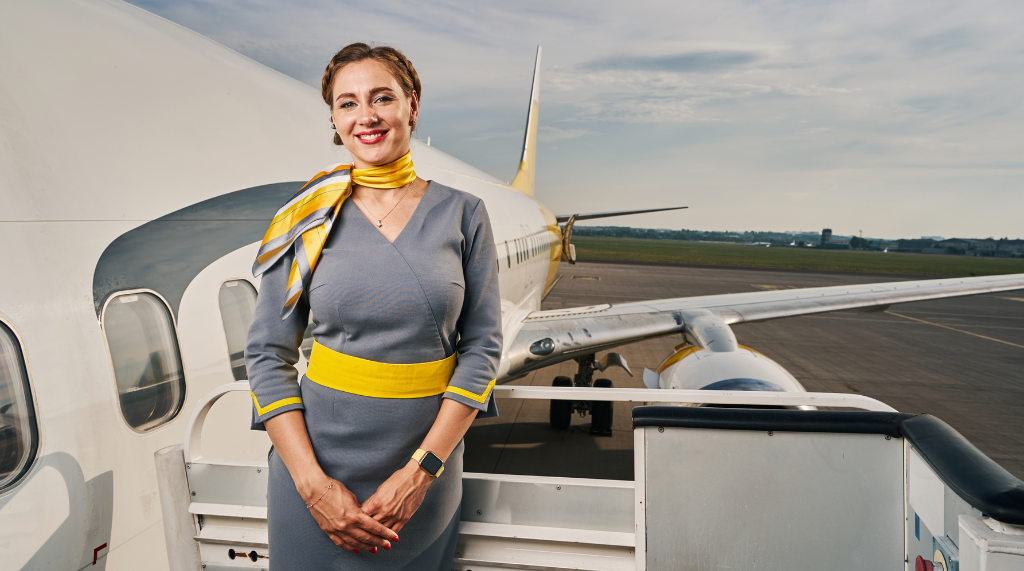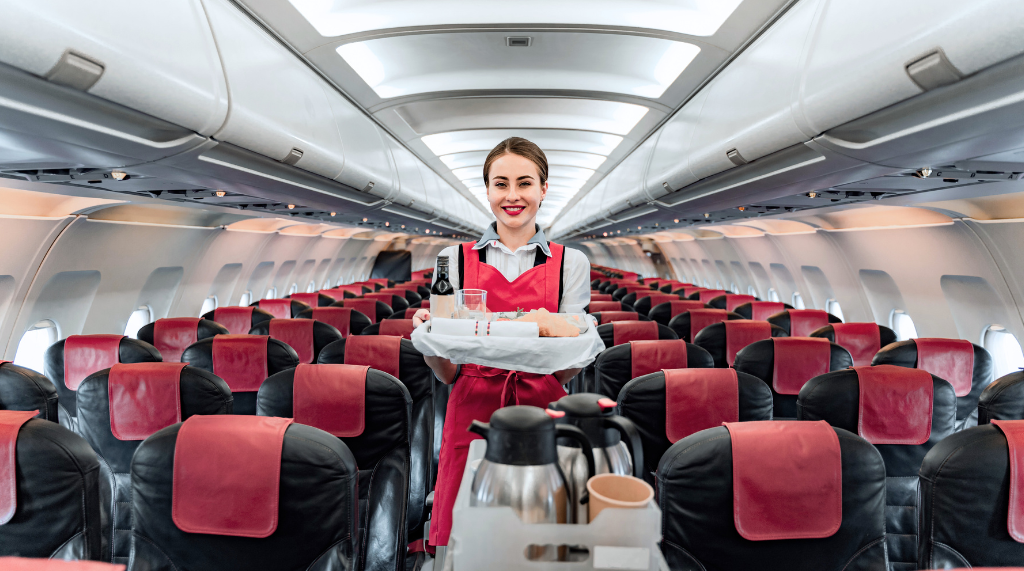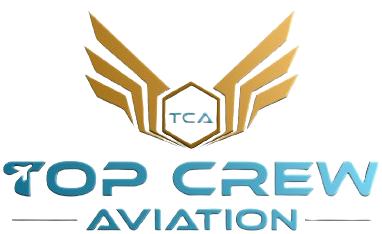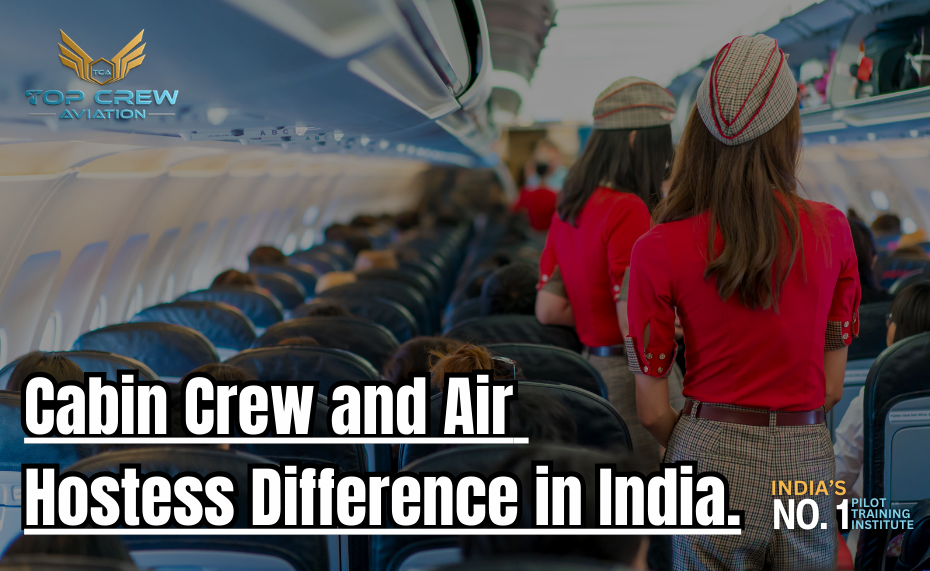Introduction
Hi, Friends. Do you see yourself working as an aviation professional? Then, you must be familiar with roles like air hostess and cabin crew. But what do these roles mean? Before joining an aviation institute, it’s important to understand the difference between a Cabin Crew member and an Air Hostess. Although often used interchangeably, both roles have their unique responsibilities. The term “Cabin Crew” refers to all staff members working on board to ensure passenger safety and comfort. “Air Hostess” specifically refers to female crew members who serve and assist passengers. Knowing this difference helps you choose the right training program. Understanding these roles can guide your career path in the aviation industry and ensure you’re prepared for the right position.
Cabin Crew and Air Hostess Definition
- Air Hostess: Historically, people have used this term for female cabin crew members responsible for the comfort and safety of passengers during flights. This term is associated with a specific gender.
- Cabin Crew: It’s a relatively new term and is gender-neutral. It includes all flight attendants, such as air hostesses and male flight attendants. It reflects the modern approach to the profession and became popular with the expansion of the aviation industry.
Expanding upon these definitions, let’s look into the historical foundations of these terms to understand their evolution in industry usage.
Historical Origination of Terms:
- Air Hostess: The term is from the early days of the aviation industry when commercial aviation started to become popular. When the profession was predominantly female, people used this term to denote women employed to manage passenger services and safety. A pioneering figure as an air hostess was Ellen Church. She became an air hostess in May 1930. Before that, Ellen was working as a nurse. Her past work experience gave her an advantage. Church’s career set an example and inspired others to pursue their careers in this sector.

- Cabin Crew: In the early days, people used the term “steward,” but as the airline industry expanded and the profession evolved to include both men and women, they began to prefer the term ‘cabin crew. Heinrich Kubis, a German flight attendant in the early 20th century, is considered one of the first cabin crew members. His experience in the hospitality industry provided him with an advantage. The industry’s push towards greater professionalism and the need for specialized roles within the cabin further highlighted the requirement for capable individuals like Kubis.
After exploring the definitions and historical contexts of these roles, it is important to consider the eligibility criteria. Knowing the requirements for each role helps aspirants determine which path aligns best with their aviation goals.
Cabin Crew / Air Hostess Eligibility Difference.
For both, many standard requirements are common, including age requirements, educational background, physical fitness, and language proficiency. However, there are some specific requirements:
Air Hostess: Historically, the candidates have been women, although some airlines have now updated their criteria. The role shares many requirements with those of cabin crew. However, specific airlines may have additional criteria, such as language proficiency or experience in customer service.
Cabin Crew: It’s an inclusive term with no gender restrictions. Any interested candidate can apply for the role. There are standard requirements for the role:
- They need at least 60% in 12th grade from any recognized board.
- They should be between 17 and 26 years old.
- The minimum height requirements are:
- Female:155 cm
- Male:165 cm
- BMI Requirement:
- Female:18-22
- Male:18-25
- No visible tattoos on the neck, face, arms, or legs.
- They shouldn’t have colour blindness.
Aspirants need to meet these requirements. However, there could be additional requirements for some skills, and airlines may ask to complete specific training programs.
Cabin Crew / Air Hostess Training and Certification
Similar to eligibility, their professional development training is almost the same. Both roles require training in various skills.
Air Hostess: Air hostess training institutes have study programs, and some airlines provide additional specialized training per their requirements. These programs cover essential topics such as in-flight safety procedures, passenger service, emergency response, communication skills, and practical training.

Cabin Crew: Candidates go through rigorous training that covers an in-depth study and practical implementation of topics like safety procedures, customer service, first aid, conflict resolution, standard Cabin Crew Training, aviation management, and hospitality. The training often includes practical sessions and simulations to prepare candidates for real-world scenarios.
After completing the training, candidates get the certificate. The certification validates that the individual is fully equipped to handle the duties and demands of the role.
Cabin Crew / Air Hostess Roles and Responsibilities
The air hostess and cabin crew have many roles and responsibilities that are in common, as mentioned below:
- Passenger Safety
- Customer Service
- In-Flight Services
- Providing medical care
- Crew Coordination
Cabin crew responsibilities can be role-specific also, for example, “pre- and post-flight responsibilities” and “Regulatory Compliance.”.
Cabin Crew Career Opportunities After Training,
After completing training and getting the necessary certifications, graduates apply for the job. With recent expansion in the aviation industry, there are many career opportunities for these roles. Many national and international airlines hire candidates for cabin crew jobs.
Career opportunities in airlines:
- Air India
- Qantas
- JAL
- AirAsia India
- Emirates
- SpiceJet
- Air France
- GoFirst
- Lufthansa
- IndiGo
Similarly, there are Turkish Airlines, Singapore Airlines, Vistara, British Airways, and other airlines where candidates can make their careers.
Which is Better, the Cabin Crew or the Air Host?
When choosing a career as a cabin crew or air hostess, the decision largely depends on personal aspirations and career goals. For those who want neutral gender roles with broader opportunities, a position as cabin crew offers an ideal role. It encompasses both male and female flight attendants and is gaining wide recognition across the aviation industry.
The role of air hostess is for those attracted to the historical significance and traditional role associated with being an air hostess. This term is gender-specific, but as the industry expands, the standards are evolving.
The responsibilities, training, and career opportunities are largely similar for both roles, with the difference being the terminology and perception. In the end, choice depends on individual preferences.
Best Cabin Crew / Air Hostess Training Institute in India.
Frankfinn Institute of Air Hostess Training.
Top Crew Aviation (Jaipur Rajasthan India)
Bombay Flying Club Collage Aviation (Mumbai)
AKSA International: Air Hostess Training Institute
Universal Aviation Training Institute (Chennai)
Jet Airways Training Academy (Mumbai, Kolkata).
Final Thought!
Understanding the difference between the roles helps aspirants make a more informed decision about their careers. Cabin Crew represents a modern, inclusive approach, appealing to those seeking gender-neutral roles with broader opportunities. On the other hand, the air hostess role holds historical significance and may resonate with those who appreciate its traditional roots. Each role has its own set of work profiles and opportunities, but the decision ultimately lies with the aspirants and their aviation career goals and personal preferences. For more clarity, contact us here at Top Crew Aviation.

